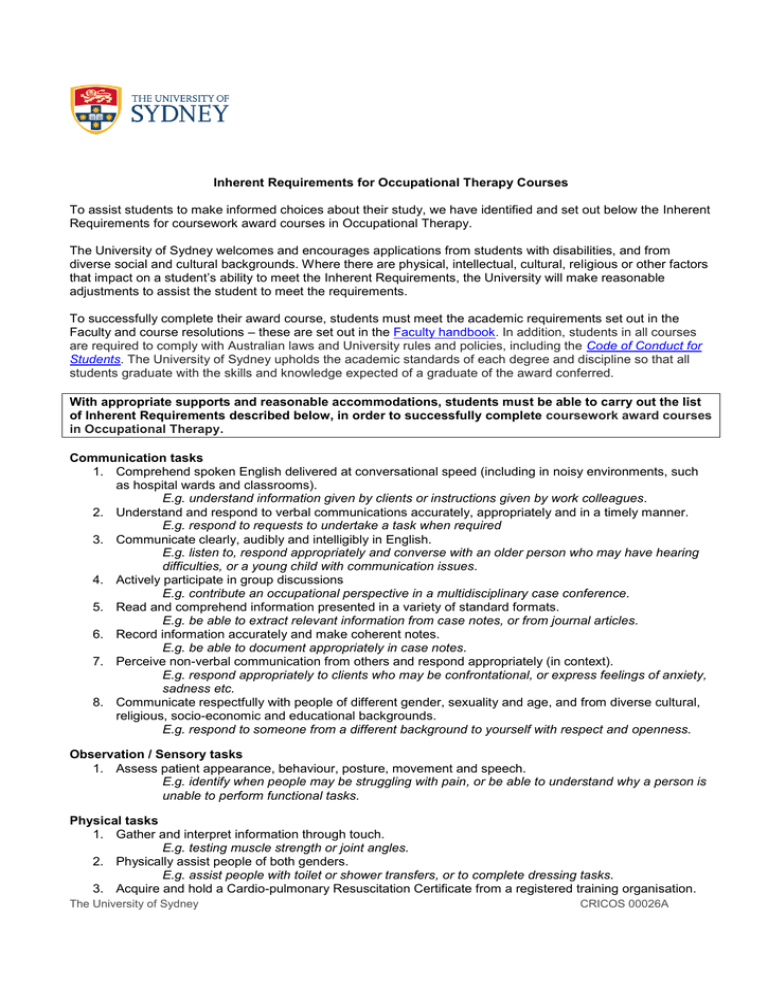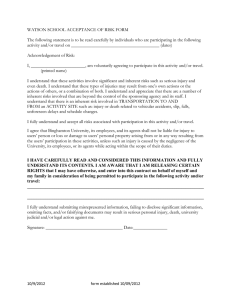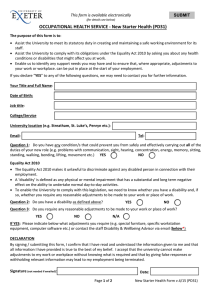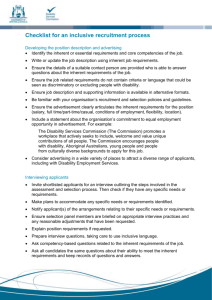Inherent Requirements for Occupational Therapy Courses To assist
advertisement

Inherent Requirements for Occupational Therapy Courses To assist students to make informed choices about their study, we have identified and set out below the Inherent Requirements for coursework award courses in Occupational Therapy. The University of Sydney welcomes and encourages applications from students with disabilities, and from diverse social and cultural backgrounds. Where there are physical, intellectual, cultural, religious or other factors that impact on a student’s ability to meet the Inherent Requirements, the University will make reasonable adjustments to assist the student to meet the requirements. To successfully complete their award course, students must meet the academic requirements set out in the Faculty and course resolutions – these are set out in the Faculty handbook. In addition, students in all courses are required to comply with Australian laws and University rules and policies, including the Code of Conduct for Students. The University of Sydney upholds the academic standards of each degree and discipline so that all students graduate with the skills and knowledge expected of a graduate of the award conferred. With appropriate supports and reasonable accommodations, students must be able to carry out the list of Inherent Requirements described below, in order to successfully complete coursework award courses in Occupational Therapy. Communication tasks 1. Comprehend spoken English delivered at conversational speed (including in noisy environments, such as hospital wards and classrooms). E.g. understand information given by clients or instructions given by work colleagues. 2. Understand and respond to verbal communications accurately, appropriately and in a timely manner. E.g. respond to requests to undertake a task when required 3. Communicate clearly, audibly and intelligibly in English. E.g. listen to, respond appropriately and converse with an older person who may have hearing difficulties, or a young child with communication issues. 4. Actively participate in group discussions E.g. contribute an occupational perspective in a multidisciplinary case conference. 5. Read and comprehend information presented in a variety of standard formats. E.g. be able to extract relevant information from case notes, or from journal articles. 6. Record information accurately and make coherent notes. E.g. be able to document appropriately in case notes. 7. Perceive non-verbal communication from others and respond appropriately (in context). E.g. respond appropriately to clients who may be confrontational, or express feelings of anxiety, sadness etc. 8. Communicate respectfully with people of different gender, sexuality and age, and from diverse cultural, religious, socio-economic and educational backgrounds. E.g. respond to someone from a different background to yourself with respect and openness. Observation / Sensory tasks 1. Assess patient appearance, behaviour, posture, movement and speech. E.g. identify when people may be struggling with pain, or be able to understand why a person is unable to perform functional tasks. Physical tasks 1. Gather and interpret information through touch. E.g. testing muscle strength or joint angles. 2. Physically assist people of both genders. E.g. assist people with toilet or shower transfers, or to complete dressing tasks. 3. Acquire and hold a Cardio-pulmonary Resuscitation Certificate from a registered training organisation. The University of Sydney CRICOS 00026A Inherent Requirements for Occupational Therapy Courses 4. Cleanse hands and forearms using disinfecting products. E.g. adhering to infection control procedures between client interactions. 5. Put on clothing and masks designed to minimise the spread of infection and protect the wearer. E.g. gowning up in a burns ward. 6. Meet ongoing immunisation requirements. E.g. to provide adequate protection for self and others, to prevent the spread of Hepatitis B. 7. Independently carry and manipulate instruments, materials and equipment necessary for clinical care. E.g. making sure a person is able to use a wheelchair both inside a workplace and in the home. 8. Attend clinical or fieldwork placements in a range of settings (E.g. urban, rural, hospitals, clinics, community) and for the required number of hours, within a reasonable period. Intellectual tasks 1. Gather, comprehend and organise information. E.g. working out what information is relevant from a client file. 2. Integrate theory and knowledge from various sources. E.g. considering evidence, practical constraints and a client’s unique circumstances and needs when designing therapy programs. 3. Develop options and assess and compare their respective merits. E.g. working out the most appropriate piece of equipment to recommend for a client. 4. Accurately recall information without reference. E.g. to be able to think on your feet, and answer questions from clients and carers. 5. Accurately undertake arithmetic calculations. E.g. to accurately score standardised assessments, or determine appropriate measurements when recommending home adaptations. 6. Engage in scientific and clinical reasoning. E.g. locate and present evidence from the literature to support a selected intervention; identify ethical issues such as how to manage a home visit for a client, or when to disclose information to carers. 7. Understand another person’s perspective. E.g. be empathetic to clients in a difficult personal situation, or when their values are different to your own. 8. Complete clinical tasks in a safe and reasonable time frame. E.g. performing tasks when they need to be done, such assessing a new inpatient who has been referred prior to discharge over the weekend. 9. Maintain a sufficient level of concentration to focus on an activity to completion. E.g. completing a comprehensive assessment and write up a report for a workplace assessment. Interpersonal and social interactions 1. Control the expression of your own emotions. E.g. not allowing your emotions or priorities to override your immediate responsibilities for a client – for instance, looking after an older person who faints or is incontinent. 2. Be able to work effectively in the face of uncertainty and adapt to changing environments. E.g. being flexible when last minute changes occur, such as children not wanting to participate in a planned activity. 3. Accept and fulfill responsibilities you are given within the workplace. E.g. performing expected tasks in the workplace, such as following organisational rules about mobile phone use, and keeping the workspace tidy and clean. 4. Manage your own physical and mental health effectively. E.g. identifying when you may not be able to undertake tasks and letting the appropriate person know and making arrangements to cover your duties. 5. Respect personal and professional boundaries. E.g. recognising your role as a student in an organisation and not criticising workmates from your own perspective. The University of Sydney CRICOS 00026A Inherent Requirements for Occupational Therapy Courses 6. Dress appropriately and safely for the clinical workplace. E.g. where a uniform is not required, dressing professionally so that clients and other work colleagues are not distracted, and closed in shoes worn in hospital settings. FREQUENTLY ASKED QUESTIONS Why have a list of Inherent Requirements for Occupational Therapy Courses We think it’s important for students to be aware of the Inherent Requirements they will need to meet in university subjects and courses. This information enables prospective students to make informed decisions about their subject and career choices. In the case of Occupational Therapy and other health professional degrees, many of the Inherent Requirements relate to patient contact. This contact increases with each year of the course and we believe it’s important to be clear from the beginning about what is required to be able to successfully complete the course. The Inherent Requirements are likely to be particularly helpful for students with disabilities. Many students successfully manage their disabilities with external support, and opt not to notify the University. However, the University’s Disability Services assists hundreds of current students with a disability, and provides prospective students with advice about the support services offered at the University. Where necessary, after confidential registration of a disability, Disability Services negotiates reasonable adjustments for students with the relevant Faculty. Adjustments to coursework and assessments may also be made for students with carer’s responsibilities, or cultural or religious needs. These adjustments may include such things as building and timetabling modifications, recording teaching material and special examination provisions. For fieldwork placements, it may include negotiating with supervisors in advance of the placement for reasonable adjustments. Adjustments must be reasonable and cannot compromise the academic integrity of a course. Reasonable adjustments are provided to assist students to achieve the inherent requirements, not as a substitute for them. How are lists of Inherent Requirements developed? They are developed from the required learning outcomes of the courses. Course structure and content, including learning outcomes, are designed to ensure that the course meets required standards. In addition to meeting general higher education standards, the health professional courses are accredited (inspected and approved) by specialist groups. There are 14 health professions regulated by the Australian Health Practitioner Agency (AHPRA) and profession specific boards or councils are responsible for assessing programs of study and education providers against accreditation standards. In the case of many university subjects, the Inherent Requirements are purely cognitive. However, the health professional courses, in addition to teaching cognitive skills, train students to diagnose and treat clients and patients. Students’ abilities to do this are assessed in structured examinations and students are required to perform supervised care of clients and patients satisfactorily when on placement. Patient and client safety must be ensured at all times and the healthcare institutions, the registered practitioners supervising, and, the University have a duty of care to these patients and clients. Students are required to comply with relevant requirements for placement organisations (e.g. NSW health). The health placement requirements are at: http://sydney.edu.au/current_students/enrolment/course_check.shtml Do I have to disclose any disability I believe I may have? Is there an assessment? No, the information on Inherent Requirements is provided for your guidance. While registration with Disability Services is necessary for you to obtain reasonable adjustments, you are not otherwise required to disclose your disability to the University, unless it poses a risk to your health or safety or to that of others. What should I do if I am worried about my ability to successfully undertake a listed essential requirement? You can make initial contact with a course advisor via the Occupational Therapy Administrator or with Disability Services to discuss your specific issue. Liaison will occur, if necessary, with appropriate protection of your privacy. The Occupational Therapy Administrator can be contacted on fhs.occupationaltherapy@sydney.edu.au. The Disability Services Team can be contacted on +61 2 86278422 or disability.services@sydney.edu.au. The University of Sydney CRICOS 00026A Inherent Requirements for Occupational Therapy Courses What is an adjustment? These are modifications or accommodations made by the University that have the effect of assisting a student with a disability to participate or access something on the same basis as someone without a disability. Common accommodations include aids to vision or hearing (which many people of course wear every day). Disability Services at the University works to support students with disabilities, including negotiating reasonable adjustments for students. These adjustments are frequently related to assessment, e.g. extra time in examinations, allowing students to type instead of handwrite, or may relate to such issues as timetabling or access. Other assistance for fieldwork may include adjusting hours of work and the allocation of the type of placement may also be adjusted where needed to ensure the psychological safety of the student. The University of Sydney has obligations under the Disability Discrimination Act 1992 (Cth), the AntiDiscrimination Act 1977 (NSW) and the Disability Standards for Education 2005 (Cth) to ensure that reasonable adjustments are available. Adjustments must be reasonable and cannot compromise the academic integrity of a course. Reasonable adjustments are provided to assist students to achieve the Inherent Requirements, not as a substitute for them. Can I enrol even if I am not sure I will be able to carry out some of the Inherent Requirements? Yes. In fact, it will usually be unlawful for the University to restrict enrolment on the basis of disability, or to discriminate against students with a disability in other ways. What happens if I do enrol and I am unable to carry out some of the Inherent Requirements? Assessment is carried out with approved reasonable adjustments. If, even with reasonable adjustments, you are unable to carry out some of the Inherent Requirements, you may fail an essential component of the course. In this event, you will be unable to graduate with the health professional degree. The University of Sydney CRICOS 00026A




